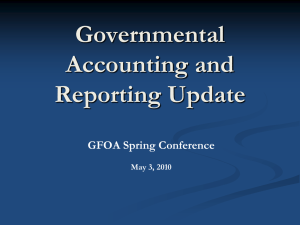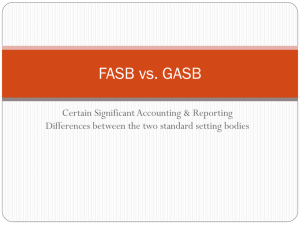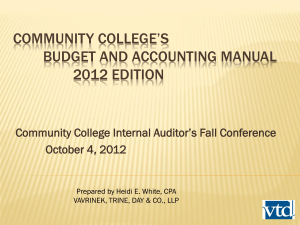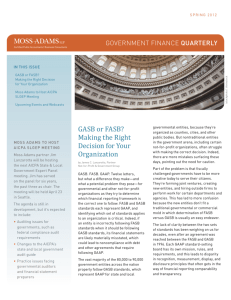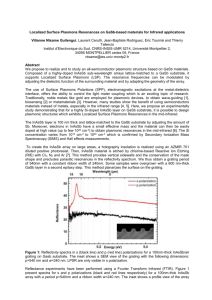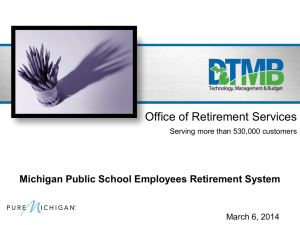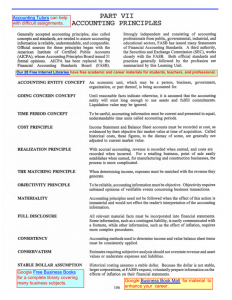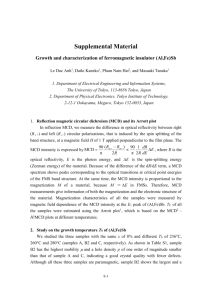Who, Or What, Are Gasb And Fasb -
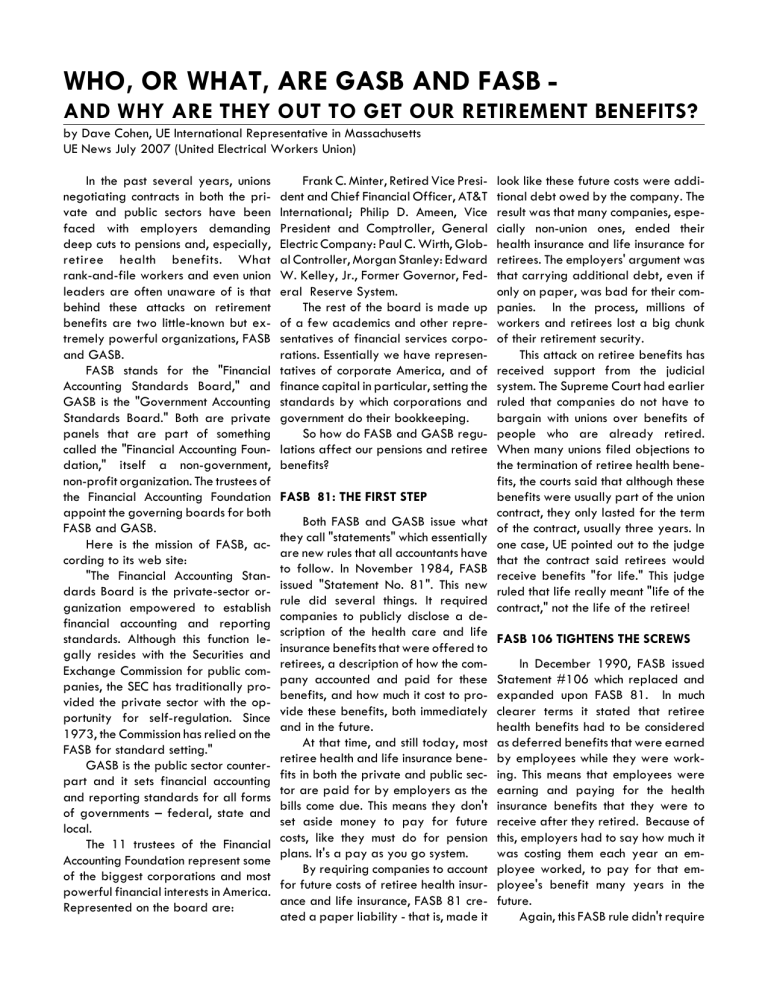
WHO, OR WHAT, ARE GASB AND FASB -
AND WHY ARE THEY OUT TO GET OUR RETIREMENT BENEFITS?
by Dave Cohen, UE International Representative in Massachusetts
UE News July 2007 (United Electrical Workers Union)
In the past several years, unions negotiating contracts in both the private and public sectors have been faced with employers demanding deep cuts to pensions and, especially, retiree health benefits. What rank-and-file workers and even union leaders are often unaware of is that behind these attacks on retirement benefits are two little-known but extremely powerful organizations, FASB and GASB.
FASB stands for the "Financial
Accounting Standards Board," and
GASB is the "Government Accounting
Standards Board." Both are private panels that are part of something called the "Financial Accounting Foundation," itself a non-government, non-profit organization. The trustees of the Financial Accounting Foundation appoint the governing boards for both
FASB and GASB.
Here is the mission of FASB, according to its web site:
"The Financial Accounting Standards Board is the private-sector organization empowered to establish financial accounting and reporting standards. Although this function legally resides with the Securities and
Exchange Commission for public companies, the SEC has traditionally provided the private sector with the opportunity for self-regulation. Since
1973, the Commission has relied on the
FASB for standard setting."
GASB is the public sector counterpart and it sets financial accounting and reporting standards for all forms of governments – federal, state and local.
The 11 trustees of the Financial
Accounting Foundation represent some of the biggest corporations and most powerful financial interests in America.
Represented on the board are:
Frank C. Minter, Retired Vice President and Chief Financial Officer, AT&T
International; Philip D. Ameen, Vice
President and Comptroller, General
Electric Company: Paul C. Wirth, Global Controller, Morgan Stanley: Edward
W. Kelley, Jr., Former Governor, Federal Reserve System.
The rest of the board is made up of a few academics and other representatives of financial services corporations. Essentially we have representatives of corporate America, and of finance capital in particular, setting the standards by which corporations and government do their bookkeeping.
So how do FASB and GASB regulations affect our pensions and retiree benefits?
FASB 81: THE FIRST STEP
Both FASB and GASB issue what they call "statements" which essentially are new rules that all accountants have to follow. In November 1984, FASB issued "Statement No. 81". This new rule did several things. It required companies to publicly disclose a description of the health care and life insurance benefits that were offered to retirees, a description of how the company accounted and paid for these benefits, and how much it cost to provide these benefits, both immediately and in the future.
At that time, and still today, most retiree health and life insurance benefits in both the private and public sector are paid for by employers as the bills come due. This means they don't set aside money to pay for future costs, like they must do for pension plans. It's a pay as you go system.
By requiring companies to account for future costs of retiree health insurance and life insurance, FASB 81 created a paper liability - that is, made it look like these future costs were additional debt owed by the company. The result was that many companies, especially non-union ones, ended their health insurance and life insurance for retirees. The employers' argument was that carrying additional debt, even if only on paper, was bad for their companies. In the process, millions of workers and retirees lost a big chunk of their retirement security.
This attack on retiree benefits has received support from the judicial system. The Supreme Court had earlier ruled that companies do not have to bargain with unions over benefits of people who are already retired.
When many unions filed objections to the termination of retiree health benefits, the courts said that although these benefits were usually part of the union contract, they only lasted for the term of the contract, usually three years. In one case, UE pointed out to the judge that the contract said retirees would receive benefits "for life." This judge ruled that life really meant "life of the contract," not the life of the retiree!
FASB 106 TIGHTENS THE SCREWS
In December 1990, FASB issued
Statement #106 which replaced and expanded upon FASB 81. In much clearer terms it stated that retiree health benefits had to be considered as deferred benefits that were earned by employees while they were working. This means that employees were earning and paying for the health insurance benefits that they were to receive after they retired. Because of this, employers had to say how much it was costing them each year an employee worked, to pay for that employee's benefit many years in the future.
Again, this FASB rule didn't require
employers to actually set aside money in a bank account to pay for these retiree health benefits - but if they didn't, then they had to count future benefits as a yearly liability. This again provided employers with the excuse to end retiree's health benefits, saying they didn't want to overburden their companies with debt.
Here is how FASB 106 defines the situation:
"In exchange for the current services provided by the employee, the employer promises to provide, in addition to current wages and other benefits, health and other welfare benefits after the employee retires. It follows from that view that postretirement benefits are not gratuities but are part of an employee's compensation for services rendered. Since payment is deferred, the benefits are a type of deferred compensation. The employer's obligation for that compensation is incurred as employees render the services necessary to earn their postretirement benefits."
GASB 45: PUBLIC EMPLOYEES
TARGETED
In June 2004, the Governmental
Accounting Standards Board issued
Statement 45, which essentially applied the same standards as FASB 106 to the public sector. Pensions in the public sector operate much the same as they do in the private sector; money is set-aside in a pension trust fund to cover the future costs of employees retiring. Retiree health insurance was handled on a pay as you go basis.
towns or cities appropriate each year enough money to pay for the health insurance they provide to retirees. The assumption is that the town or city will always be there, so there is no need to set aside the money. GASB 45 is changing this.
The GASB 45 rule includes frequent use of the acronym "OPEB," which is the new jargon for "other post employment benefits.” In plain language this refers to retirement benefits other then the pension - including health insurance, life insurance and other things.
"From an accrual accounting perspective, the cost of OPEB, like the cost of pension benefits, generally should be associated with the periods in which the exchange occurs, rather than with the periods (often many years later) when benefits are paid or provided.
However, in current practice, most
OPEB plans are financed on a pay-as-you-go basis, and financial statements generally do not report the financial effects of OPEB until the promised benefits are paid." (from
GASB 45)
What has been the immediate effect of GASB 45? Just as in the private sector, cities, towns and states now have to report huge liabilities for future payments towards retirees’ health insurance. Taxpayers are used to their governments owing money to pay for the building of new schools, or buying equipment, but now there is an added liability for retirees’ health insurance. These additional liabilities can affect the bond ratings for cities and towns, forcing them to pay higher interest rates to borrow money. In a time when the federal government is cutting aid to cities and towns to pay for wars, this creates another crisis for municipalities.
"This Statement improves the relevance and usefulness of financial reporting by (a) requiring systematic, accrual-basis measurement and recognition of OPEB cost (expense) over a period that approximates employees' years of service and (b) providing information about actuarial accrued liabilities associated with OPEB and whether and to what extent progress is being made in funding the plan." (from
GASB 45, emphasis added.)
This quote makes it clear that
GASB now expects cities and towns to begin to set aside money for these
OPEBs.
Already some cities and towns are talking about reducing or eliminating health insurance for retirees as a way to reduce or eliminate these new liabilities. Even where unions are able to stop this, we will see millions of dollars that could be usefully spent diverted into banks, into new trust funds that will be set up to pay for OPEBs.
WHAT ELSE ARE THEY PLAN-
NING?
GASB has embarked upon a new project. They want to set up a "system" that will measure "service efforts and accomplishments" (SEA). To them this means a system to measure whether a government fulfills its stated goals. Their analogy is that in the corporate world investors can judge a corporation by how much money they make off of its stock. This is reported in the corporations' annual report. But,
GASB claims there is no way to judge whether an elected government is living up to its promises. So they want to set up a measuring system that would have to be included in an annual government report.
While it might sound nice to be able to see what an elected government accomplishes, there are problems with this scheme. In the GASB/FASB corporate world the bottom line is money going to the shareholders. They don't care how this money is gotten. A company may cut wages and benefits, move to a country where unions are outlawed, use child labor. None of that matters, only the bottom line. So how will they judge local governments? If they decide that low taxes are a measure of "success", then lowering a towns' expenses by cutting services, closing schools, cutting the pay and benefits of employees would be a
"good" thing.
Already many in the public sector are claiming that GASB is really overstepping their bounds and are trying
Page 2 of 4
to force "corporate" values on the public sector. Surprisingly, the state of
Texas has gone furthest in rebelling against GASB (see sidebar at end of article.)
As if all this was not enough, FASB is currently discussing more rules concerning defined benefit pension plans.
One financial company described these rules as "the most controversial project the FASB has ever undertaken."
Essentially FASB wants to change the way corporations report the costs of their pensions and OPEBs. Here's what they want to change.
Currently when companies report how much money they actually have in their pension plan - the value of the stocks and bonds in the fund - they present an average, spread out over five years. The government allows this
"smoothing" to make up for the ups and downs of the stock market. The market could be very high on reporting day and then drop the next. This five-year average is supposed to present a truer picture of the value of the pension plan. The amounts of money companies have to put into their plans each year is determined by the value of the plan.
FASB wants to make companies present yearly figures on what their pension plan is worth at a specific moment. This may create a situation where the value of the plan changes dramatically, thus yearly changing how much money a company will have to put into their plan.
FASB also wants to change the practice of how pension assets and liabilities are presented in company's annual reports. Currently they are usually reported on in a footnote, not included in the listing of the companies assets or liabilities. FASB wants to put pension plans into the regular calculations. If a pension plan is 90 percent funded (which is allowed by law) the company would have to report the 10 percent underfunding as a loss, thus lowering the company's annual earnings and hurting the banks and rich people who own most of their stock.
An article by an Associated Press business reporter makes clear how this will affect some companies. "The most widely cited example is General Motors Corp., which has been staggered by both slowing sales and mammoth obligations to workers and retirees. If
General Motors was forced to accurately show its true benefit costs on its balance sheet, the company's book value - the difference between its assets and liabilities - would have been cut from $27.7 billion in 2004 to a negative $18.5 billion, according to
Credit Suisse estimates."
How would GM react to this? By trying to further cut the benefits they owe retirees. A banker quoted in the
AP article put it best. ""Changing accounting rules can cause companies to change their behavior." In this case the accounting changes are causing employers to devastate the safety net that most workers were counting on for their retirement years.
POINTS TO REMEMBER
All companies and all units of government are faced with these FASB and GASB rules, so no one has an advantage over anyone else. However larger government units must comply with the GASB regulations sooner then small ones.
Setting aside money, though strongly suggested by GASB, is not mandatory. But many municipalities fear that if they don't set aside money their bond ratings (and therefore their ability to borrow money) will suffer.
Many employers are proposing to eliminate these benefits for future retirees, not current employees. This is usually just the first step, and once it's gone for some, the rest will surely follow.
Political action is needed. These financial accounting rules are supposed to promote honest bookkeeping, to eliminate Enron-type scandals. Instead they are being used to promote and enforce a corporate political agenda, the destruction of retiree health benefits.
TEXAS REBELS AGAINST GASB RETIREE HEALTHCARE RULE
By Al Hart, Editor, UE News
A rebellion against GASB's stranglehold on state and local governments and public workers' benefits broke out this spring in an unexpected place - the state government of Texas.
It started on March 1 when State
Comptrollor Susan Combs sent a letter to the financial officers of the other 49 states, calling on them to fight the imposition of GASB rule 45. GASB 45 is to be phased in over the next three years, taking effect in fiscal 2007 for states and large cities. The rule requires state and local governments to account for future retiree healthcare and "other post-employment benefits" in current financial statements. Like most governments, Texas and its municipalities currently funds retiree healthcare on a "pay-as-you-go" basis.
The Texas House of Representatives then joined the rebellion, passing
House Bill 2365 by a vote of 142-0.
On May 22, the Texas Senate followed suit. The original bill prohibited the state and local governments from following GASB 45; the somewhat softened final version makes the GASB rule optional for Texas government entities - they can choose to follow
Page 3 of 4
GASB or not.
In a written statement co-signed by
State Sen. Robert Duncan and State
Rep. Vicki Truitt (all three of them Republicans), Combs laid out her reasons for instigating this uprising against
GASB. While "on the surface" the accounting requirements of GASB 45 appear to be "fairly innocuous," the danger lies in the requirement that benefit costs "be measured and reported for a period up to 50 years in the future," which "has a far-reaching and potentially damaging effect."
Combs and the two legislators added that, "the American Academy of Actuaries believes the rule would damage the credibility of a balance sheet and add unwarranted liability.
Many actuaries recommend predicting liabilities for no more than five to ten years into the future."
'BECAUSE I SAY SO'
Combs, Duncan and Truitt noted that Carl Johnson, a main author of
GASB 45, came to Austin to testify in legislative hearings leading to the passage of HB 2365. He was asked to explain how the rule was developed and its "underlying theory." The three
Texans summarized Johnson's arrogant response to lawmakers' questions:
"Ipse dixit, the Latin phrase for 'because I say so.'"
Projections of future costs of retiree health benefits can fluctuate widely, affected by such factors as changes in interest rates, the stock market, healthcare inflation, demographics, and changes in the benefits offered. Susan Spataro, the auditor of
Travis County, Texas (which includes the city of Austin) hired two professional accounting firms to estimate the cost of pre-funding the county's retiree health insurance benefits. One firm projected a cost of $89 million, while the other came up with a $320 million price tag.
Combs, Duncan and Truitt commented on the effect of GASB 45 on this county:
“Travis County would be required to front an annual required contribution of $46 million. To obtain these extra millions, property taxes would have to increase 16 percent, the proceeds of which would be devoted exclusively to the GASB contribution. If that price went unpaid, it would compound, eventually showing these fictional liabilities as exceeding assets.
The county would be insolvent on paper. The county would be in the same unenviable position as the state - register a huge, so-called liability and take the ensuing lumps, or cut retiree benefits."
One of Combs's arguments against applying the GASB rule in Texas is that retiree benefits there cannot be called "obligations" because public employees in Texas have no collective bargaining rights and therefore no legal labor contracts. But Andy Homer, director of government affairs for the
Texas Public Employees Association, seems more worried about the threat of GASB than about current state policies. The New York Times reported that, "he feared that the disclosure
(required by GASB 45) itself would hasten the day when the state might try to rescind retiree heath care coverage it has already promised."
According to the Times, Gerald
Carney, spokesman for GASB, said this was the first time in the board's
23-year history that any legislature had tried to overturn a GASB rule.
"This is a disturbing reminder of what can happen when politicians interfere with an independent system that was designed to protect financial reporting from politics and other self-interests."
In other words, Carney finds it disturbing that elected representatives of the people would try to prevent the unelected representatives of big financial interests from dictating government policies. The Times also reported on May 18 that GASB is "watching to see if Texas inspires copycat rebellions elsewhere." They didn't have to watch for long. In late May, the Connecticut
House of Representatives passed a bill empowering the state comptroller to ignore not just GASB 45, but all GASB rules. The mutiny in Connecticut is especially ironic, since that state is the headquarters of GASB, which is located in Norwalk.
